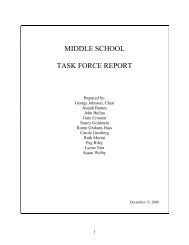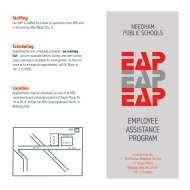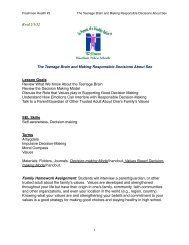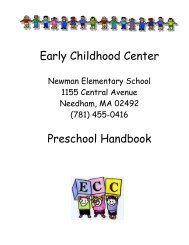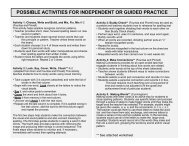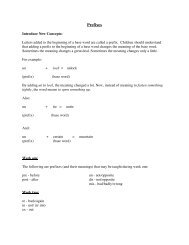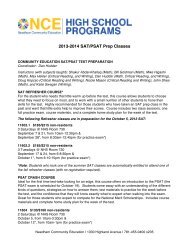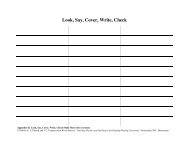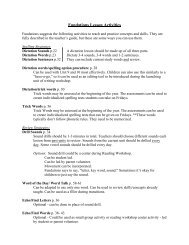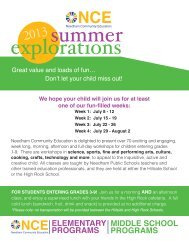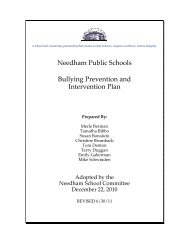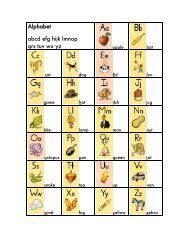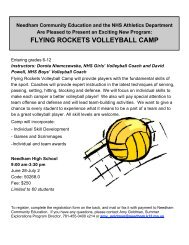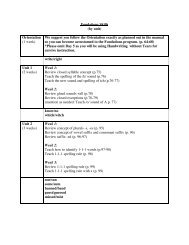2012-2013 District Goals year end Update 6-13 - Needham Public ...
2012-2013 District Goals year end Update 6-13 - Needham Public ...
2012-2013 District Goals year end Update 6-13 - Needham Public ...
You also want an ePaper? Increase the reach of your titles
YUMPU automatically turns print PDFs into web optimized ePapers that Google loves.
<strong>Needham</strong> <strong>Public</strong> Schools<br />
<strong>District</strong> <strong>Goals</strong> <strong>2012</strong>-<strong>20<strong>13</strong></strong><br />
Goal One: Advance Standards Based Learning!<br />
To refine and continue to put into practice a system of curriculum, instruction, and assessment that enables<br />
each student to be engagedi n challenging academic experiences that are grounded in clearly defined<br />
standards.!<br />
Objective #1:<br />
Students in all classrooms have the opportunity to increase their achievement as a result of instruction that is<br />
differentiated and grounded in best research practices.<br />
Objective #2:<br />
Students develop proficiency in a language other than English, and they will develop the technological, civic, and scientific<br />
skills necessary to adapt and respond to the conditions of 21st century global change.<br />
Objective #3:<br />
Teacher teams and administrators identify essential content and learning expectations for each grade level/subject area<br />
that are aligned to state standards and will clearly communicate them to students and parents<br />
Objective #4:<br />
Teachers incorporate common assessments, collaborative data analysis, and specific feedback into their instructional<br />
practice.<br />
Objective #5:<br />
Teachers provide students and parents with explicit feedback regarding their progress towards meeting identified learning<br />
objectives.<br />
Goal Two: Develop social, emotional, wellness, and citizenship skills!<br />
To ensure students develop the knowledge and skills that empower healthy, resilient, and culturally proficient<br />
global citizens who commit to act with integrity, respect, and compassion. !<br />
Objective #1:<br />
Students experience a sense of wellness, participation, and safety in response to meaningful adult and peer relationships within a<br />
caring school environment.<br />
Objective #2:<br />
Students develop social competence, problem solving skills, a positive sense of identity, autonomy, and a sense of purpose through<br />
consistent, layered, and effective instruction of social and emotional skills at all levels.<br />
Objective #3:<br />
Students engage in age appropriate service activities that enable them to contribute to or act on local or global social<br />
needs and that provide them opportunities to develop social, civic, and academic skills through reflection and analysis of<br />
their efforts.<br />
Objective #4:<br />
Students and staff develop competencies to enable them to understand and effectively address matters of diversity,<br />
racism, ethnocentrism, and bias in the context of the pluralistic communities in which they live.<br />
Goal Three: Ensure infrastructure supports district values and learning goals!<br />
To build and carry out a sustainable plan for financial, building, technological, and human resources that<br />
enables our learning goals and is responsive to student and school needs.!<br />
Objective #1:<br />
School leaders engage in long-range planning that supports sustainable school infrastructure and operations.<br />
Objective #2:<br />
School administrators implement modern and efficient information systems and training opportunities to manage school and<br />
district operations, enhance communication, and sustain culturally proficient teaching, learning, and administrative environments.<br />
Objective #3:<br />
School staff create a safe and healthy work place that is culturally proficient, promotes a positive work ethic and reflects the<br />
district’s core values.<br />
Objective #4:bjective #5:<br />
Teachers experience professional development and supervision programs that provide learning opportunities which are<br />
job-embedded and enable them to: acquire rigorous and relevant content knowledge; implement best instructional<br />
strategies; receive support and guidance; and promote individual career growth.<br />
Scholarship, Personal Growth, Citizenship, Community
Goal One: Advance Standards Based Learning <br />
To refine and continue to put into practice a system of curriculum, instruction, and assessment that enables each student to be engaged in<br />
challenging academic experiences that are grounded in clearly defined standards.<br />
Objective #1:<br />
Students in all classrooms have the opportunity to increase their achievement as a result of instruction that is differentiated and grounded in best<br />
research practices.<br />
What are the Action Steps?<br />
What is the<br />
timeline?<br />
What evidence will show we are progressing as a district?<br />
Status<br />
• Integrate technology tools into classrooms as an integral<br />
part of differentiated curriculum and instruction<br />
practice.<br />
(Dir. Technology, Instructional Tech. Specialists,<br />
Curriculum Leaders, Sp. Ed. Leadership, Principals)<br />
<strong>2012</strong>-2015<br />
Specialists and teachers are able to successfully augment highimpact<br />
instructional technology into the classroom; School<br />
Improvement Plans describe progress<br />
Some progress<br />
• Develop a system of responsive early intervention at<br />
each school and ensure all teachers utilize effective<br />
instructional strategies and progress monitoring.<br />
(Principals, Curriculum Leaders, Sp.Ed. Leadership)<br />
<strong>2012</strong>-2015<br />
A Response to Intervention (RtI) structure in place at each<br />
school; Students experience a greater variety of instructional<br />
strategies to meet their learning needs as evidenced by<br />
administrators’ teacher observations and evaluation documents;<br />
effective co-teaching models increase at all levels<br />
Some progress<br />
2 Approved 11/14/12
Goal One: Advance Standards Based Learning <br />
To refine and continue to put into practice a system of curriculum, instruction, and assessment that enables each student to be engaged in<br />
challenging academic experiences that are grounded in clearly defined standards.<br />
Objective #2:<br />
Students develop proficiency in a language other than English, and they will develop the technological, civic, and scientific skills necessary to adapt<br />
and respond to the conditions of 21st century global change.<br />
What are the Action Steps?<br />
What is the<br />
timeline?<br />
What evidence will show we are progressing as a district?<br />
Status<br />
• Explore online, bl<strong>end</strong>ed, and 1 to 1 computer-based<br />
learning opportunities and develop plan for further<br />
student and staff participation. (Curriculum/Sp.Ed<br />
Leadership, Principals)<br />
<strong>2012</strong>-2014<br />
Plan in place for future implementation; Program of Studies<br />
details course and learning opportunities<br />
Some progress<br />
• Identify opportunities and engage students in experiences<br />
that develop STEAM (Science, Technology, Engineering,<br />
Arts, Math) awareness and skills. (STEAM curriculum<br />
leadership, Principals)<br />
<strong>2012</strong>-2014<br />
Increased student participation in middle school engineering<br />
and design course; Increased student participation in robotics;<br />
enhanced partnership with PTC Corporation; Increased teacher<br />
participation in Project LIFT and other internships; Increased<br />
interdisciplinary collaboration and programming; School<br />
Improvement Plans detail progress<br />
Some progress<br />
• Begin implementing the recomm<strong>end</strong>ations from the<br />
World Language Program Review. (Dir. Program Dev.,<br />
Dir. World Languages, Principals)<br />
<strong>2012</strong>-2014<br />
Action plan for implementation is published and<br />
recomm<strong>end</strong>ations addressed<br />
Significant<br />
progress<br />
• Develop digital citizenship guidelines and ensure<br />
teachers and students practice good digital citizenship.<br />
(Dir. of Technology, Technology staff, Principals)<br />
<strong>2012</strong>-2014<br />
Digital citizenship guidelines are developed and teachers and<br />
students understand and demonstrate responsibilities<br />
Did not meet<br />
3 Approved 11/14/12
Goal One: Advance Standards Based Learning <br />
To refine and continue to put into practice a system of curriculum, instruction, and assessment that enables each student to be engaged in<br />
challenging academic experiences that are grounded in clearly defined standards.<br />
Objective #3:<br />
Teacher teams and administrators will identify essential content and learning expectations for each grade level/subject area that are aligned to<br />
state standards and will clearly communicate them to students and parents.<br />
What are the Action Steps?<br />
What is the<br />
timeline?<br />
What evidence will show we are progressing as a district?<br />
Status<br />
• Implement K-5 writing maps. Complete the<br />
development and pilot K-5 reading maps. (Literacy<br />
Coord., Literary Spec., Principals)<br />
<strong>2012</strong>-<strong>20<strong>13</strong></strong><br />
All K-5 teachers use writing maps to plan instruction;<br />
School Improvement Plans detail progress; Feedback from<br />
teachers piloting the K-5 Reading Maps<br />
Significant<br />
progress<br />
• Begin to incorporate Math Common Core practice<br />
standards into math instruction throughout the district.<br />
(Math Curr. Leaders, Math Coach, Principals)<br />
<strong>2012</strong>-2015<br />
Teachers begin to incorporate math practice standards in<br />
their instruction<br />
Some Progress<br />
• Emphasize literacy experiences in planning and<br />
instruction outside of the ELA classroom. (Instructional<br />
Leaders, Literacy Specialists, Principals)<br />
<strong>2012</strong>-2015<br />
Content area teachers begin to understand, develop, and<br />
engage students in literacy experiences<br />
Significant<br />
progress<br />
• Familiarize teachers with the major shifts in<br />
instruction/ practice that the ELA Common Core<br />
entails and begin to shift instruction to incorporate the<br />
use of more non-fiction complex texts. (ELA Curriculum<br />
Leaders, Literacy Specialists, Principals)<br />
<strong>2012</strong>-2015<br />
Students experience instruction that helps them to read<br />
complex, non-fiction texts<br />
Significant<br />
progress<br />
• Conduct PE/Health program review to evaluate its<br />
effectiveness. (Dir of Wellness, Dir. Program Dev.)<br />
<strong>2012</strong>-<strong>20<strong>13</strong></strong><br />
PE/Health program reviewed, report written, and<br />
presented to School Committee<br />
Significant<br />
progress<br />
• Continue to implement the recomm<strong>end</strong>ations from<br />
English Language Arts Program Review. (ELA/Literacy<br />
Instr. Leaders, ELA Teachers, Literacy Specialist, Principals)<br />
<strong>2012</strong>-2015<br />
Additional recomm<strong>end</strong>ations from ELA program review<br />
are addressed; curriculum is modified; and instrumental<br />
changes are incorporated into School Improvement Plans<br />
Significant<br />
progress<br />
4 Approved 11/14/12
Goal One: Advance Standards Based Learning <br />
To refine and continue to put into practice a system of curriculum, instruction, and assessment that enables each student to be engaged in<br />
challenging academic experiences that are grounded in clearly defined standards.<br />
Objective #3:<br />
Teacher teams and administrators will identify essential content and learning expectations for each grade level/subject area that are aligned to<br />
state standards and will clearly communicate them to students and parents.<br />
What are the Action Steps?<br />
What is the<br />
timeline?<br />
What evidence will show we are progressing as a district?<br />
Status<br />
• Implement the new elementary math program, Think<br />
Math! in Kindergarten. (Math Instructional leaders,<br />
Principals)<br />
<strong>2012</strong>-<strong>20<strong>13</strong></strong><br />
Professional development provided and Kindergarten<br />
teachers all teaching the Think Math! program<br />
✔ Met<br />
• Provide effective mainstream curriculum learning<br />
expectations, modifications, and program<br />
development through general and special education<br />
staff partnership. (Dir. of Student Dev., Sp. Ed.<br />
Leadership, Dir. of Program Dev., Curriculum Leaders,<br />
Principals)<br />
<strong>2012</strong>-2014<br />
Increased instances in which special education and<br />
general education staff collaborate on curriculum and<br />
instructional matters to target learning; school and<br />
department ag<strong>end</strong>as detail increased collaboration<br />
Significant<br />
progress<br />
• Examine the alignment of the middle and high school<br />
math programs to the Common Core and adjust<br />
programs as necessary. (MS/HS Math Curriculum<br />
Leaders, Dir. Program Dev., Principals)<br />
<strong>2012</strong>-<strong>20<strong>13</strong></strong><br />
Plan is in place for making needed adjustments to<br />
curriculum; Middle and high school programs of study<br />
detail revisions/changes<br />
Significant<br />
progress<br />
• Align IEP goals to the new Common Core<br />
frameworks. (Director of Student Dev., Sp. Ed.<br />
Directors)<br />
<strong>2012</strong>-2015<br />
IEP goals reflect new standards<br />
Some progress<br />
• Vertically articulate special education programming<br />
from pre-school to post-graduate. (Director of Student<br />
Dev., Sp. Ed. Directors)<br />
<strong>2012</strong>-2014<br />
Coherent program planned and documented Pre-K<br />
through PG and shared broadly; decreased number of out<br />
of district placements; decreased number of IEP<br />
rejections; increased NPS program options<br />
Significant<br />
progress<br />
5 Approved 11/14/12
Goal One: Advance Standards Based Learning <br />
To refine and continue to put into practice a system of curriculum, instruction, and assessment that enables each student to be engaged in<br />
challenging academic experiences that are grounded in clearly defined standards.<br />
Objective #4:<br />
Teachers incorporate common assessments, collaborative data analysis, and specific student feedback on student performance into their instructional<br />
practice.<br />
What are the Action Steps?<br />
What is the<br />
timeline?<br />
What evidence will show we are progressing as a district?<br />
Status<br />
• Continue to develop, refine and administer at least<br />
two common assessments in each grade, subject area<br />
or course at each level. (Curriculum Leaders, Sp.Ed.<br />
leadership, Principals)<br />
<strong>2012</strong>-2014<br />
Increased number of grade, subject area or courses at each level<br />
have developed and administered common assessments; Teams<br />
analyze data from these assessments to inform, modify, and/or<br />
differentiate instruction; School Improvement Plan for each<br />
school detail progress<br />
Some progress<br />
• Analyze data from various relevant sources (MCAS,<br />
district, grade/course common assessments) and use<br />
the information to: develop goals for students’<br />
learning, modify instructional practices, provide<br />
intervention as needed, and facilitate student<br />
transitions between grades. (Curriculum leaders,<br />
Sp.Ed./ELL Leadership, Principals)<br />
<strong>2012</strong>-2014<br />
Data analyzed, school improvement plans reflect general<br />
areas of focus, teachers have information on student needs<br />
and target instruction accordingly; MCAS results show<br />
<strong>Needham</strong> becomes a Level One district<br />
Significant<br />
Progress<br />
• Ensure that increased number of students have met<br />
DESE target expectations for ELA, Math, and Science.<br />
(Curriculum Leaders, Sp.Ed./ELL Leadership, Principals)<br />
<strong>2012</strong>-<strong>20<strong>13</strong></strong><br />
MCAS results indicate <strong>Needham</strong> attains Level One district<br />
status<br />
Significant<br />
Progress<br />
6 Approved 11/14/12
Goal One: Advance Standards Based Learning <br />
To refine and continue to put into practice a system of curriculum, instruction, and assessment that enables each student to be engaged in<br />
challenging academic experiences that are grounded in clearly defined standards.<br />
Objective #5:<br />
Teachers provide students and parents with explicit feedback regarding their progress toward meeting identified learning objectives.<br />
What are the Action Steps?<br />
What is the<br />
timeline?<br />
What evidence will show we are progressing as a district?<br />
Status<br />
• Pilot a standards-based reporting system for grade 2.<br />
(Dir. Program Dev., Principals)<br />
<strong>2012</strong>-<strong>20<strong>13</strong></strong><br />
Grade 2 standards-based progress report piloted<br />
✔ Met<br />
• Ensure that teachers help students to understand<br />
academic learning goals and provide them with<br />
meaningful feedback on their progress towards<br />
meeting those goals. (Curriculum & Sp.Ed. Leadership,<br />
Principals)<br />
<strong>2012</strong>-2014<br />
Learning goals are explicit and understood by students at the<br />
start of each curriculum unit; Performance standards are in place<br />
and used to help students understand progress towards meeting<br />
learning goals; Evidence of learning goals and performance<br />
standards posted in classrooms; report cards and progress reports<br />
indicate specific feedback<br />
Significant<br />
progress<br />
7 Approved 11/14/12
Goal Two: Develop Social, Emotional, Wellness, <br />
and Citizenship Skills <br />
To ensure students develop the knowledge and skills that empower healthy, resilient, and culturally proficient global citizens who commit to act<br />
with integrity, respect, and compassion.<br />
Objective #1:<br />
Students experience a sense of wellness, participation, and safety in response to meaningful adult and peer relationships within a caring school<br />
environment.<br />
What are the Action Steps?<br />
What is the<br />
timeline?<br />
What evidence will show we are progressing as a district?<br />
Status<br />
• Improve student attachment at middle and high school<br />
level. (Dir. Health & Wellness, MS & HS Principals, Dir,<br />
Student Dev.)<br />
<strong>2012</strong>-<strong>20<strong>13</strong></strong><br />
An increased number of Pollard Middle School and NHS students<br />
report having an adult at school they can talk to: 2010-67% - <strong>2012</strong>-<br />
69%; <strong>Needham</strong> High School students: 2010-60% - <strong>2012</strong>-62%;<br />
School Improvement Plans detail progress<br />
Some progress<br />
• Provide baseline data through parent, staff and student<br />
surveys for perceptions of SEL learning experiences<br />
and healthy schools, such as high expectations, school<br />
connectedness and parent/community involvement.<br />
(Dir. of Student Development & Prog. Evaluation)<br />
<strong>2012</strong>-<strong>20<strong>13</strong></strong><br />
Baseline data on school climate measures established<br />
✔ Met<br />
• Evaluate and refine transition structures that facilitate<br />
adult-student and student/student relationships for all<br />
students as they move from one school building to the<br />
next. Particular attention will be paid to members of<br />
special populations including students with disabilities<br />
and English Language Learners. (Sp.Ed. Dir, Guidance<br />
Dir., Principals)<br />
<strong>2012</strong>-<strong>20<strong>13</strong></strong><br />
Document of all transition activities in the district will be<br />
published; School Improvement Plans detail progress<br />
Some progress<br />
8 Approved 11/14/12
Goal Two: Develop Social, Emotional, Wellness, <br />
and Citizenship Skills <br />
To ensure students develop the knowledge and skills that empower healthy, resilient, and culturally proficient global citizens who commit to act<br />
with integrity, respect, and compassion.<br />
Objective #2:<br />
Students develop social competence, problem solving skills, a positive sense of identity, autonomy, and a sense of purpose, through consistent,<br />
layered and effective instruction of social and emotional skills at all levels.<br />
What are the Action Steps?<br />
What is the<br />
timeline?<br />
What evidence will show we are progressing as a district?<br />
Status<br />
• Plan and develop teacher professional development<br />
sessions so that new teachers and administrators will<br />
participate in SEL and cultural proficiency professional<br />
development. (Dir. of Human Resources, Dir. Program<br />
Development, Dir. of Student Development)<br />
<strong>2012</strong>-2014<br />
Social and Emotional Learning and Cultural Proficiency<br />
professional development will be included in <strong>20<strong>13</strong></strong>-2014 teacher<br />
orientation and professional development offerings<br />
Did not meet<br />
• Continue and evaluate the Middle School Parenting<br />
Conference (Dir. Student Dev.)<br />
<strong>2012</strong>-<strong>20<strong>13</strong></strong><br />
Parent att<strong>end</strong>ance will increase by 10% over 2011; Post conference<br />
survey will indicate high or very high rating of conference<br />
✔ Met<br />
• Redesign the Kindergarten registration web page and<br />
the Kindergarten process. (Dir. of student Dev., Dir, of<br />
Planning)<br />
<strong>2012</strong>-<strong>20<strong>13</strong></strong><br />
Improved registration process developed; website updated; Know<br />
Your Schools program implemented<br />
✔ Met<br />
9 Approved 11/14/12
Goal Two: Develop Social, Emotional, Wellness, <br />
and Citizenship Skills <br />
To ensure students develop the knowledge and skills that empower healthy, resilient, and culturally proficient global citizens who commit to act<br />
with integrity, respect, and compassion.<br />
Objective #3:<br />
Students engage in age appropriate service activities that enable them to contribute to or act on local or global social needs and that provide them<br />
opportunities to develop social, civic, and academic skills through reflection and analysis of their efforts.<br />
What are the Action Steps?<br />
What is the<br />
timeline?<br />
What evidence will show we are progressing as a district?<br />
Status<br />
• Continue to integrate service learning activities and<br />
opportunities into the curriculum and communicate<br />
these to the school community. (Community Service<br />
Learning Coordinators, Principals, Teachers)<br />
<strong>2012</strong>-<strong>20<strong>13</strong></strong><br />
Each school will implement at least one curriculum-based service<br />
learning experience that includes an opportunity for student<br />
reflection; School Improvement Plans will highlight student<br />
learning and service<br />
✔ Met<br />
• Assess service learning activities to determine need and<br />
impact on overall student learning and school culture.<br />
(Community Service Learning Coordinators, Principals,<br />
Teachers)<br />
<strong>2012</strong>-<strong>20<strong>13</strong></strong><br />
Survey results will show level of participation and impact on<br />
student learning<br />
Did not meet<br />
10 Approved 11/14/12
Goal Two: Develop Social, Emotional, Wellness, <br />
and Citizenship Skills <br />
To ensure students develop the knowledge and skills that empower healthy, resilient, and culturally proficient global citizens who commit to act<br />
with integrity, respect, and compassion.<br />
Objective #4:<br />
Students and staff develop competencies to enable them to understand and effectively address matters of diversity, racism, ethnocentrism, and bias<br />
in the context of the pluralistic communities in which they live.<br />
What are the Action Steps?<br />
What is the<br />
timeline?<br />
What evidence will show we are progressing as a district?<br />
Status<br />
• Evaluate and refine support structures for students and<br />
staff of color, including mentoring opportunities and<br />
affinity groups. (Dir. of Student Dev., Dir. of METCO,<br />
Principals)<br />
<strong>2012</strong>-<strong>20<strong>13</strong></strong><br />
May <strong>20<strong>13</strong></strong> survey and report will provide summary of district<br />
support; School Improvement Plans detail progress<br />
Did not meet<br />
• Provide opportunities for students, staff, and parents to<br />
develop an understanding and awareness of culturally<br />
proficient practices. (Dir. of Student Dev., Dir. METCO,<br />
Principals)<br />
<strong>2012</strong>-2014<br />
Community programs initiated; professional development reflects<br />
increased culturally responsive offerings; Empowering Multi-<br />
Cultural Initiatives (EMI) registration increases over 2011; School<br />
Improvement Plans detail progress<br />
Some progress<br />
• Develop international collaborations to promote<br />
learning and student and staff educational exchanges<br />
that meet district criteria for student and staff<br />
exchanges. (Dir. of Planning, Principals, Dir. of Guidance)<br />
<strong>2012</strong>-<strong>20<strong>13</strong></strong><br />
Global Competency Certificate update and report shared; Virtual<br />
school and student collaborations explored; additional<br />
student/staff exchanges initiated<br />
Some progress<br />
11 Approved 11/14/12
Goal Three: Ensure Infrastructure supports <br />
district values and learning goals <br />
To build and carry out a sustainable plan for financial, building, technological, and human resources that enables our learning goals and is<br />
responsive to student and school needs.<br />
Objective #1:<br />
School leaders engage in long-range planning that supports a sustainable school infrastructure and operations.<br />
What are the Action Steps?<br />
What is the<br />
timeline?<br />
What evidence will show we are progressing as a district?<br />
Status<br />
• Annually engage in long-range financial and<br />
infrastructure planning to better understand the “big<br />
picture” and inform the resource allocation process.<br />
(Director of Finance)<br />
<strong>2012</strong>-<strong>20<strong>13</strong></strong><br />
Five <strong>year</strong> forecast updated;<br />
Capital Improvement Plan submitted<br />
Did not meet<br />
✔ Met<br />
• Assess the programmatic suitability of the Mitchell and<br />
Hillside Elementary Schools, Pollard Middle School and<br />
the School Administration Building. (Director of Finance,<br />
Superint<strong>end</strong>ent)<br />
<strong>2012</strong>-<strong>20<strong>13</strong></strong><br />
School administration space assessment completed;<br />
Statement of Interest (SOI) submitted to MSBA<br />
✔ Met<br />
• Develop sustainable technology plan that addresses 21 st<br />
century skills, assistive technology requirements and<br />
modern administrative systems. (Director of Technology)<br />
<strong>2012</strong>-<strong>20<strong>13</strong></strong><br />
Administrative IT plan developed;<br />
Capital Improvement Plan updated<br />
Some progress<br />
• Plan for and maintain adequate operational resources to<br />
maintain school facilities and equipment in good<br />
working order. (Director of Finance)<br />
<strong>2012</strong>-<strong>20<strong>13</strong></strong><br />
FY14 school operating budget approved;<br />
expanded high school cafeteria plan approved<br />
✔ Met<br />
12 Approved 11/14/12
Goal Three: Ensure Infrastructure supports <br />
district values and learning goals <br />
To build and carry out a sustainable plan for financial, building, technological, and human resources that enables our learning goals and is<br />
responsive to student and school needs.<br />
Objective #2:<br />
School administrators implement modern and efficient information systems and training opportunities to manage school and district operations,<br />
enhance communications, and sustain culturally proficient teaching, learning, and administrative environments.<br />
What are the Action Steps?<br />
What is the<br />
timeline?<br />
What evidence will show we are progressing as a district?<br />
Status<br />
• Ensure resources and documents are in place to assist<br />
ELL students and their families (Dir. of Student Dev.,<br />
Dir. of Program Development)<br />
<strong>2012</strong>-<strong>20<strong>13</strong></strong><br />
Important documents will be identified. Translations of these<br />
documents in the primary non-English languages of the district<br />
will be evident on website and in school documents<br />
✔ Met<br />
• Expand and continue to pilot and evaluate the use of<br />
iPads in grade 8 to determine their effectiveness for<br />
enhancing and differentiating learning in a 1-1<br />
instructional model. (Director of Technology)<br />
<strong>2012</strong>-2014<br />
Report to School Committee will demonstrate effectiveness and<br />
increased student engagement; plan for continued deployment<br />
developed and shared<br />
Some progress<br />
• Implement new financial and payroll services<br />
program. (Dir. of Finance, Dir. Human Resources)<br />
<strong>2012</strong>-2014<br />
New program implemented in phases; payroll implemented in<br />
January <strong>20<strong>13</strong></strong><br />
Significant<br />
progress<br />
• Procure and utilize data integration services to link<br />
components of the overall information system and to<br />
improve the accuracy and consistency of information<br />
contained in the information subsystems. (Dir. Tech.)<br />
<strong>2012</strong>-2014<br />
Data integration services fully implemented<br />
Significant<br />
progress<br />
• Implement system to permit on-line and electronic<br />
payments of school fees, in conjunction with the Town.<br />
(Dir. of Finance)<br />
<strong>2012</strong>-<strong>20<strong>13</strong></strong><br />
Online system implemented for food services, KASE,<br />
transportation, Athletics, and Preschool with phased<br />
implementation of other programs<br />
✔ Met<br />
• Continue the work of the Teacher and Administrator<br />
Compensation Study Committee. (Dir. Human Res.)<br />
<strong>2012</strong>-<strong>20<strong>13</strong></strong><br />
Committees produce document that complements collective<br />
bargaining agreement process<br />
✔ Met<br />
• Review and revamp district website as appropriate.<br />
(Dir. of Com., Planning & Com Ed.; Dir. of Technology)<br />
<strong>2012</strong>-2014<br />
<strong>District</strong> website refreshed and updated<br />
Did not meet<br />
<strong>13</strong> Approved 11/14/12
Goal Three: Ensure Infrastructure supports <br />
district values and learning goals <br />
To build and carry out a sustainable plan for financial, building, technological, and human resources that enables our learning goals and is<br />
responsive to student and school needs.<br />
Objective #3:<br />
School staff create a safe and healthy work place that is culturally proficient, promotes a positive work ethic and reflects the district’s core values.<br />
What are the Action Steps?<br />
What is the<br />
timeline?<br />
What evidence will show we are progressing as a district?<br />
Status<br />
• Continue the Study Committee to conclude the Unit D<br />
job descriptions and evaluation instrument. (Director of<br />
Human Resources)<br />
<strong>2012</strong>-<strong>20<strong>13</strong></strong><br />
Job descriptions and evaluation documents completed<br />
Significant<br />
progress<br />
• Convene a Study Committee to improve the Unit C<br />
evaluation instrument. (Director of Human Resources)<br />
<strong>2012</strong>-<strong>20<strong>13</strong></strong><br />
Evaluation instrument adopted<br />
✔ Met<br />
• Develop a staff handbook for all employees. (Director of<br />
Human Resources)<br />
<strong>2012</strong>-2014<br />
Employee handbook published and distributed<br />
Did not meet<br />
14 Approved 11/14/12
Goal Three: Ensure Infrastructure supports <br />
district values and learning goals <br />
To build and carry out a sustainable plan for financial, building, technological, and human resources that enables our learning goals and is<br />
responsive to student and school needs.<br />
Objective # 4: Teachers experience professional development and supervision programs that provide learning opportunities which are jobembedded<br />
and enable them to: acquire rigorous growth and relevant content knowledge; implement best instructional strategies; receive support<br />
and guidance; and promote individual career growth.<br />
What are the Action Steps?<br />
What is the<br />
timeline?<br />
What evidence will show we are progressing as a district?<br />
Status<br />
• Negotiate a new collective bargaining agreement with<br />
members of Units A and B. (Dir. Human Resources)<br />
<strong>2012</strong>-<strong>20<strong>13</strong></strong><br />
New contracts negotiated and signed<br />
Some progress<br />
• Implement the pilot DESE model teacher evaluation<br />
system. (Director of Human Resources, Principals)<br />
<strong>2012</strong>-<strong>20<strong>13</strong></strong><br />
Model program successfully implemented and integrated into new<br />
contract<br />
Significant<br />
progress<br />
• Determine common teacher knowledge/competencies<br />
that staff is required to demonstrate/acquire prior to<br />
receiving professional status. Director of Human<br />
Resources, Superint<strong>end</strong>ent)<br />
<strong>2012</strong>-<strong>20<strong>13</strong></strong><br />
New contracts reflect expectations for teacher and administrator<br />
learning and competencies<br />
Some progress<br />
15 Approved 11/14/12
Glossary<br />
Academic Achievement: The relative success of students in learning and mastering the school subjects that they study, as measured by tests of the<br />
knowledge and skills that were taught. Some educators believe that academic achievement should include a broader sample of performances than<br />
just test scores.<br />
Achievement Gap: Persistent differences in achievement among different groups of students as indicated by scores on standardized tests, grades,<br />
levels of educational attainment, graduation rates, and other data. Narrowing or closing this gap is one of the rationales for standards-based reform,<br />
which aims to ensure that additional attention is paid to low-performing students and that expectations are similar for all students.<br />
Action Research: The systematic investigation by teacher of some aspect of their work to help them improve their effectiveness. Action research<br />
requires that the participants identify a question or problem and then collect and analyze relevant data. It differs from conventional research in that<br />
the participants study an aspect of their own work in the classroom and int<strong>end</strong> to use the results themselves.<br />
Assessment: A test. An assessment may be part of a system for testing and evaluating individual students, groups of students, schools, or districts.<br />
Different types of assessment instruments include achievement tests, minimum competency tests, developmental screening tests, aptitude tests,<br />
observation instruments, performance tasks, and authentic assessments. Assessment may contain questions in any number of formats—multiplechoice,<br />
short response, and open-<strong>end</strong>ed response.<br />
Benchmarks: Any specific, measurable goals or objectives for students to meet at various points during the school <strong>year</strong>. Benchmarks are sometimes<br />
represented by samples of student work either from current students or from students from previous <strong>year</strong>s. A set of benchmarks can be used as<br />
checkpoints to monitor student progress in meeting performance goals within and across grade levels.<br />
Common Assessments: An evaluation developed by a group of teachers who teach the same grade, subject, or course on a common unit of study for<br />
the purpose of using the data for making decision about improving instructional practice.<br />
Content Standards: Standards that describe what students should know and be able to do in core academic subjects at each grade level. The purpose<br />
of content standards is to create a common curriculum, so that all students have access to the same curriculum and so that teachers know what they<br />
are supposed to teach.<br />
Cultural Proficiency: a model for shifting the culture of the school or district. It is a way a person or an organization make assumptions for<br />
effectively describing, responding to, and planning for issues that arise in diverse environments. Cultural proficiency is a paradigm shift from<br />
viewing cultural difference as problematic to learning how to interact effectively with other cultures. (Cultural Proficiency A Manual for School Leaders,<br />
2009)<br />
Curriculum Frameworks: A grade-by-grade description of the curriculum that will be taught in each of the subject areas as determined by a state’s<br />
educational agency. They determine what teachers will teach and what students are expected to learn.<br />
Data-Based Decision Making: The process of making decisions about curriculum and instruction on the basis of analysis of classroom data, school<br />
data, or the results of standardized tests.<br />
16 Approved 11/14/12
Differentiated Instruction: A form of instruction that seeks to maximize each student’s growth by recognizing that students have different ways of<br />
learning, different interests, and different ways of responding to instruction. In practice, it involves offering several different learning experiences in<br />
response to students’ varied needs.<br />
Formative Assessment: Evaluation carried out, often continuously or periodically, for the purpose of gathering information to improve student<br />
performance; teacher performance; and instructional methods, programs, and products.<br />
Global Education: Academic programs devoted to the study of the histories, cultures, geography, economics, and governments of the world. The<br />
emphasis is on the study of cultures over the study of political history and struggles for power between and within nations.<br />
Learning Outcomes/Expectations: An objective that states a goal or benchmark that students are expected to meet at a particular grade level in a<br />
particular subject. Specific expectations of what students are supposed to know or be able to do as a result of a specific course or learning activity.<br />
Professional Development: Learning opportunities that are designed to increase the professional knowledge and skills of teachers who are currently<br />
working in the schools.<br />
Research-Based: A descriptor of a program or policy that relies on credible, long-term studies of its effectiveness in practice.<br />
Response to Intervention (RtI): A method of intervention to provide early and responsive assistance to students experiencing academic difficulty.<br />
Service Learning: Service learning aims to deepen students’ social learning and to promote problem solving by having them engage in socially useful<br />
activities in the local community and school. It also provides them opportunities to discuss their experiences and to frame their learning within the<br />
context of current social issues.<br />
Social and Emotional Skills/Competencies: Social-emotional skills, or ‘emotional intelligence’, is the name given to the set of abilities that allows<br />
students to work with others, learn effectively, and serve essential roles in their families, communities and places of work. Research shows that<br />
social-emotional skills can be taught to students and that their presence in classrooms and schools improves academic learning.<br />
Standards-Based Learning:<br />
Unified system of research based practices in curriculum, instruction, and assessment that are focused on student learning. It is characterized by<br />
clearly defined expectations for students (i.e. standards), instructional strategies that give students multiple ways to learn and assessment practices<br />
that provide meaningful feedback for students.<br />
Summative Assessment: Evaluation used to document students’ achievement at the <strong>end</strong> of a unit or course or and evaluation of the <strong>end</strong> product of a<br />
student’s learning activity.<br />
17 Approved 11/14/12



